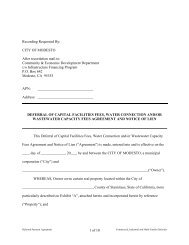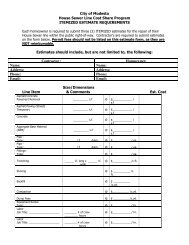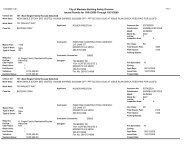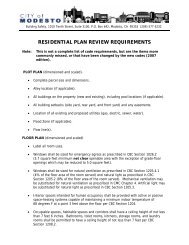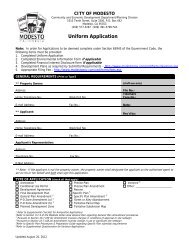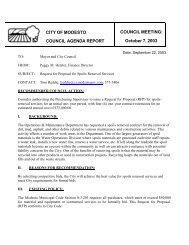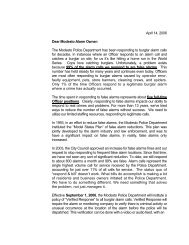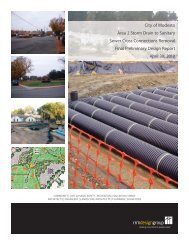Restaurant Standard Operating Procedures example - City of Modesto
Restaurant Standard Operating Procedures example - City of Modesto
Restaurant Standard Operating Procedures example - City of Modesto
You also want an ePaper? Increase the reach of your titles
YUMPU automatically turns print PDFs into web optimized ePapers that Google loves.
<strong>Restaurant</strong> Guidelines & <strong>Standard</strong> <strong>Operating</strong> <strong>Procedures</strong><br />
For<br />
Oils & Grease and Grease Control Devices<br />
1. Excess oils and grease must be placed in specified grease containers and disposed <strong>of</strong><br />
properly. There will be no oils and grease poured into the drain.<br />
2. The grease trap, grease interceptor, and/or solids interceptor must be completely<br />
cleaned or pumped out as <strong>of</strong>ten as necessary to avoid major grease and solids build-up.<br />
For grease traps and solids interceptors, ECS recommends the following:<br />
i. Skim grease layer from the grease trap at least once a week.<br />
ii. Pump-out the grease trap at least once a month.<br />
iii. Clean the solids interceptor frequently.<br />
3. Wastewater from the cleaning <strong>of</strong> kitchen floor mats must be directed through a gravity<br />
separation interceptor and then through the sanitary sewer system.<br />
The maintenance <strong>of</strong> all grease control devices will be governed under <strong>Modesto</strong> Municipal<br />
Code 5-6.219 Interceptor Maintenance:<br />
(a) Any person who owns or operates a gravity separation interceptor shall properly<br />
maintain the interceptor at all times. The interceptor shall be cleaned as <strong>of</strong>ten as<br />
necessary to ensure that sediment and floating materials do not accumulate to<br />
impair the efficiency <strong>of</strong> the interceptor. An interceptor is not considered to be<br />
properly maintained, if for any reason the interceptor is not in good working<br />
condition or if the operational fluid capacity has been reduced by more than<br />
twenty-five (25) percent by the accumulation <strong>of</strong> floating materials, sediment, oils<br />
or greases.<br />
(b) The use <strong>of</strong> chemicals, microbiological agents or other materials for the emulsification,<br />
suspension or dissolution <strong>of</strong> oil and grease is prohibited.<br />
(c) When an interceptor is cleaned, the removed sediment, liquid and floating material<br />
shall be legally disposed <strong>of</strong> in a manner other than to the <strong>City</strong>'s collection system,<br />
POTW or storm drain. Manifests for the cleaning <strong>of</strong> the interceptor shall be kept at the<br />
same facility as the interceptor and shall be available at all times for inspection.<br />
(d) If the interceptor is not maintained adequately under the conditions <strong>of</strong> use, the<br />
interceptor shall be resized and the user shall install one which is effective in<br />
accomplishing its intended purpose.<br />
(e) The owner and lessee, sub-lessee, proprietor, operator, or superintendent <strong>of</strong> any<br />
facility, required to install an interceptor, are individually and severally liable for any<br />
failure to properly maintain such an interceptor.
In addition, the following is recommended for complexes that have grease-generating<br />
facilities and private sewer lines within their property:<br />
• When cleaning the sewer lines within the facility, the line must be vacuumed at the<br />
junction between the facilities’ sewer line and the <strong>City</strong>’s sewer line. This ensures<br />
that loosened grease and other constituents does not discharge and/or accumulate<br />
into the <strong>City</strong>’s sewer line.<br />
• The owner or the appropriate representatives shall determine the maintenance<br />
schedule <strong>of</strong> the facilities’ sewer line(s).



